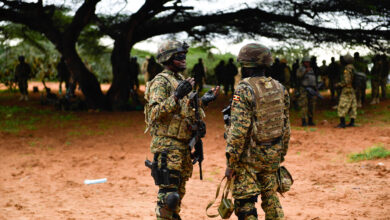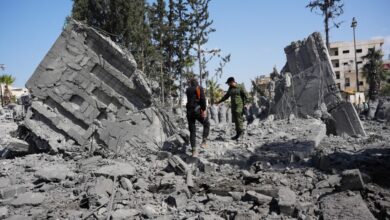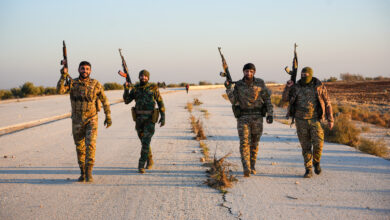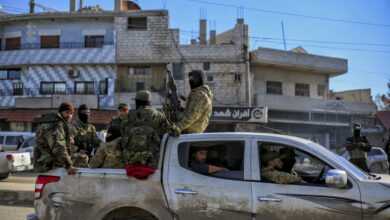Ghouta gassed: Dozens killed, hundreds affected by suspected Syria chemical attack
At least 70 people were killed by a suspected chemical weapons attack in Douma, the last opposition-held town in Eastern Ghouta, near Damascus, first responders, medics and activists said.
None of the reports have been independently confirmed.
Raed al-Saleh, head of first-responders Syria Civil Defense – better known as the White Helmets – said 70 people had “suffocated to death” and hundreds of others were affected by the suspected attack on Saturday, April 7.
The White Helmets tweeted graphic images and videos of dozens of bodies in homes and basements.
More families were found suffocated in their houses and shelters in #Douma. The number of victıms is increasing dramatically, and the ambulance teams and the @SyriaCivilDefe volunteers continue their search and rescue operations.#AssadHitsDoumawithChemicals pic.twitter.com/yEcQ3xPir7
— The White Helmets (@SyriaCivilDef) April 8, 2018
In a tweet containing graphic imagery of bodies, the pro-opposition Ghouta Media Center said more than 75 people had “suffocated” and a further 1,000 people had been affected.
The GMC blamed a barrel bomb allegedly dropped by helicopter at around 9 p.m.
In another graphic tweet, the White Helmets also blamed a helicopter-dropped barrel bomb that it said had been dropped at 8:22 p.m.
The Union of Medical Relief Organizations, an American charity that works with hospitals in Syria, told the BBC that the Damascus Rural Specialty Hospital confirmed 70 deaths, while Reuters reported Tawfik Chamaa, a Geneva-based Syrian doctor with UOSSM as saying that 150 people were killed.
“The majority were civilians, women and children trapped in underground shelters,” Chamaa said.
In a statement, the U.S.-based Syrian American Medical Society said “more than 500 cases – the majority of whom are women and children – were brought to local medical centers with symptoms indicative of exposure to a chemical agent,” adding that symptoms include “respiratory distress, central cyanosis, excessive oral foaming, corneal burns, and the emission of chlorine-like odor.”
SAMS said “Civil Defense volunteers have reported more than 42 casualties found dead in their homes” with similar symptoms.
“The reported symptoms indicate that the victims suffocated from the exposure to toxic chemicals, most likely an organophosphate element,” SAMS said.
The White Helmets’ al-Saleh said chlorine gas and an unidentified but stronger gas were dropped, Al Jazeera reported.
The Ghouta Media Center alleged that sarin, a nerve agent, was used.
Citing an official source, Syria’s state-run news agency SANA said the claims were “fabrications” by the Jaysh al-Islam opposition group that controls Douma, describing it as a “failed attempt” to slow the government advance in the enclave, the Associated Press reported.
“Jaysh al-Islam terrorists are in a state of collapse and their media outlets are [making] chemical attack fabrications in an exposed and failed attempt to obstruct advances by the Syrian Arab Army,” SANA said, the BBC reported.
International response
U.S. State Department spokesperson Heather Nauert said in a Saturday statement that the United States is closely following reports “from a number of contacts and medical personnel on the ground” regarding an alleged chemical weapons attack.
“These reports, if confirmed, are horrifying and demand an immediate response by the international community,” Nauert said. “The Assad regime and its backers must be held accountable and any further attacks prevented immediately,” adding that Russia “ultimately bears responsibility for these brutal attacks.”
The Assad regime has repeatedly been accused of using chemical weapons, with the United Nations among those blaming government forces for an attack using the sarin nerve agent that killed more than 80 people in the opposition-held village of Khan Sheikhun in April 2017.
A joint inquiry by the U.N. and the Organisation for the Prohibition of Chemical Weapons held the Syrian government responsible.
In response to the Khan Sheikhun attack, U.S. President Donald Trump ordered a cruise missile strike on a Syrian military base near Damascus.
The joint U.N.-OPCW mission is investigating reports that Syrian government forces used chlorine gas in rebel-held towns in early 2018. It has previously found that the regime has used chlorine against civilians at least three times.
Moscow on Sunday rejected claims the Syrian regime used chemical weapons.
“We firmly deny this information,” said General Yuri Yevtushenko, head of the Russian Center for Reconciliation of the Warring Sides in Syria, in comments reported by news agencies.
“We are ready, once Douma is freed from militants, to immediately send Russian specialists in radiation, chemical and biological defence to collect data that will confirm these claims are fabricated,” he added.
Deal reached for opposition fighters to leave
Since February 18, the Ghouta offensive has killed more than 1,600 civilians.
The Syrian government has used a combination of a fierce military onslaught and negotiated withdrawals to empty 95 percent of the enclave near Damascus, but rebels are still entrenched in its largest town of Douma.
The first two enclaves were evacuated under Russian-brokered deals last month that saw more than 46,000 rebels and civilians bussed to opposition-held Idlib province in the northwest.
But talks with Jaysh al-Islam, which controls Douma – the third and last pocket – faltered despite a preliminary accord last week that saw nearly 3,000 fighters and civilians bussed to Turkey-controlled Jarablus in northern Syria.
New regime air strikes reportedly hit the last rebel pocket on Sunday, despite reports the fighters had struck a ceasefire deal with regime ally Russia.
Negotiators in Douma and the Syrian state news agency SANA said a deal had been reached for negotiations with the Jaysh al-Islam rebel group.
On Sunday morning, a civilian committee taking part in the talks between the rebels and Russia announced “a ceasefire and the resumption of talks today” hoping it will lead to a “final accord.”
SANA, citing an official source, said the “Jaysh al-Islam terrorists are requesting negotiations with the Syrian government and the government will begin these negotiations within two hours.”
Syria’s government has reached an agreement for rebels to leave their battered holdout of Douma for an opposition-held town in the country’s north, state media reported on Sunday.
SANA later said the agreement would see “the departure of all so-called Jaysh al-Islam terrorists to Jarablus within 48 hours”.
In exchange Jaysh al-Islam would release hostages it had been holding, the source said. SANA reported dozens of buses were already entering Douma to begin the evacuations.
With reporting from AFP












